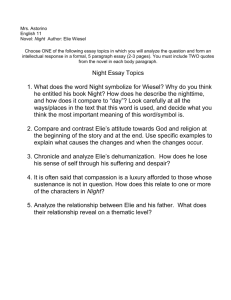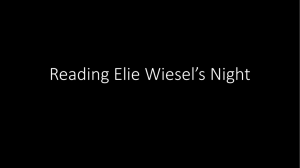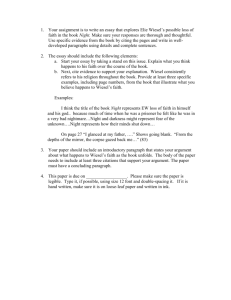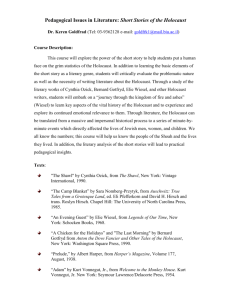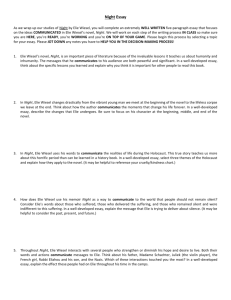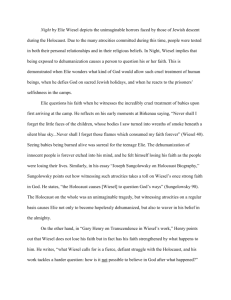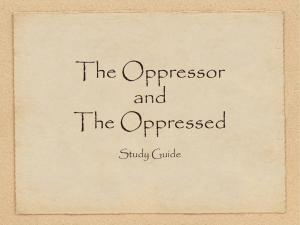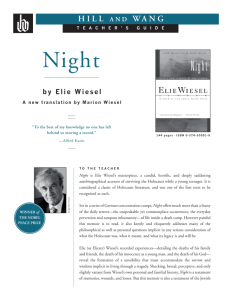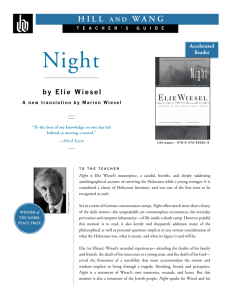NightPacketSchedule and Essay Assignment.doc
advertisement
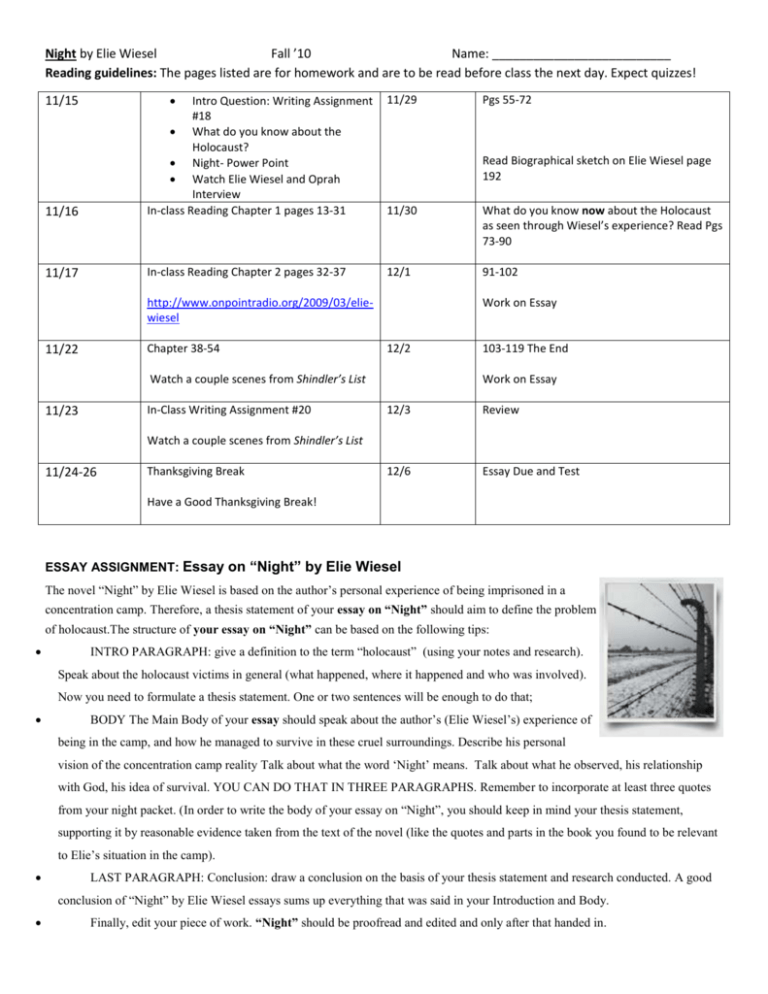
Night by Elie Wiesel Fall ’10 Name: __________________________ Reading guidelines: The pages listed are for homework and are to be read before class the next day. Expect quizzes! 11/29 11/16 Intro Question: Writing Assignment #18 What do you know about the Holocaust? Night- Power Point Watch Elie Wiesel and Oprah Interview In-class Reading Chapter 1 pages 13-31 11/30 What do you know now about the Holocaust as seen through Wiesel’s experience? Read Pgs 73-90 11/17 In-class Reading Chapter 2 pages 32-37 12/1 91-102 11/15 Read Biographical sketch on Elie Wiesel page 192 http://www.onpointradio.org/2009/03/eliewiesel Chapter 38-54 11/22 Work on Essay 12/2 Watch a couple scenes from Shindler’s List In-Class Writing Assignment #20 11/23 Pgs 55-72 103-119 The End Work on Essay 12/3 Review 12/6 Essay Due and Test Watch a couple scenes from Shindler’s List 11/24-26 Thanksgiving Break Have a Good Thanksgiving Break! ESSAY ASSIGNMENT: Essay on “Night” by Elie Wiesel The novel “Night” by Elie Wiesel is based on the author’s personal experience of being imprisoned in a concentration camp. Therefore, a thesis statement of your essay on “Night” should aim to define the problem of holocaust.The structure of your essay on “Night” can be based on the following tips: INTRO PARAGRAPH: give a definition to the term “holocaust” (using your notes and research). Speak about the holocaust victims in general (what happened, where it happened and who was involved). Now you need to formulate a thesis statement. One or two sentences will be enough to do that; BODY The Main Body of your essay should speak about the author’s (Elie Wiesel’s) experience of being in the camp, and how he managed to survive in these cruel surroundings. Describe his personal vision of the concentration camp reality Talk about what the word ‘Night’ means. Talk about what he observed, his relationship with God, his idea of survival. YOU CAN DO THAT IN THREE PARAGRAPHS. Remember to incorporate at least three quotes from your night packet. (In order to write the body of your essay on “Night”, you should keep in mind your thesis statement, supporting it by reasonable evidence taken from the text of the novel (like the quotes and parts in the book you found to be relevant to Elie’s situation in the camp). LAST PARAGRAPH: Conclusion: draw a conclusion on the basis of your thesis statement and research conducted. A good conclusion of “Night” by Elie Wiesel essays sums up everything that was said in your Introduction and Body. Finally, edit your piece of work. “Night” should be proofread and edited and only after that handed in. Hilda, Béa, Tzipora – Moishe the Beadle – Madame Schächter – Stein – Akiba Drummer – Tibi and Yosi – Juliek – Dr. Josef Megele – Franek – Zalman – Rabbi Eliahou – Meir Katz – Part II: Key Terms – Key terms important as they will enhance your understanding of the history behind the novel. Genocide – Holocaust – Adolf Hitler – Nazi Party – Sighet, Hungary – Torah – Kabbalah – Ghetto – Gestapo / SS – Propaganda – Concentration camps (work camps) Auschwitz /Birkenau/ Buna – Selections – Zyklon B (gas chambers) – Zionism – Rosh Hashanah / Yom Kippur – Judaism – Kaddish – Allied Forces – D-Day – V-E Day – V-J Day – Part III: Quotes – Some quotes to get us thinking about some of the themes of the play. “Never shall I forget that night, the first night in camp, which has turned my life into one long night, seven times cursed and seven times sealed.” “’Where is God? Where is He?’ someone behind me asked.” “We were masters of nature, masters of the world. We had forgotten everything—death, fatigue, our natural needs.” “[Rabbi Eliahou’s son] had felt that his father was growing weak, he had believed that the end was near and had sought this separation in order to get rid of the burden, to free himself from an encumbrance which could lessen his own chances of survival…. My God, Lord of the Universe, give me strength never to do what Rabbi Eliahou’s son has done.” “One day I was able to get up, after gathering all my strength. I wanted to see myself in the mirror hanging on the opposite wall. I had not seen myself since the ghetto. From the depths of the mirror, a corpse gazed back at me. The look in his eyes, as they stared into mine, has never left me.” Part IV: Discussion – Be prepared to answer these in class. 1. 2. 3. 4. 5. 6. What role does chance play in Eliezer’s survival of the Holocaust? What role does choice play? Fate? Do your answers to these questions have any implications regarding the extent of control that a person has over his or her life? (Also, remember Nora, Antigone, Oedipus, and Mr. Obi and spirit baby.) How does the concept of family and community change over the course of the play? Be sure to cite specific examples. One of the most tragic themes in Night is Eliezer’s discovery of the way that atrocities and cruel treatment can make good people into brutes. Does he himself escape this fate? Night is essentially Elie Wiesel’s memoir about his experiences in the Holocaust. Yet, there are minor differences between Wiesel’s own experiences and those of Night’s narrator, Eliezer. Why might that be? Must a memoir be absolutely factual? Describe the changes in treatment of European Jews as the novel progresses. Is there a pattern? Is it gradual? Cite specific examples in mapping the trend. Is it possible to look at Night as the story of Eliezer’s loss of innocence? Might it be argued, too, that innocence is impossible after the Holocaust? Is it tragic, or is innocence an impediment to survival, as when the Jews are too innocent to believe that Hitler really means to kill them? Elie Wiesel won the Nobel Peace Prize in 1986 for his championing of human rights around the world. How might his advocacy for human rights have grown out of his Holocaust experiences? What are the positive lessons of the Holocaust 7. 8. that Wiesel hints at in Night? Also, remember journeys: physical, psychological, philosophical, religious, spiritual. And dualistic themes: order/chaos, dream/nightmare, perception/reality, illumination/damnation, innocence/experience, freedom/escape, and insider/outsider. ** Effect, Cause, or Definition Essay Required with this unit on Night **
